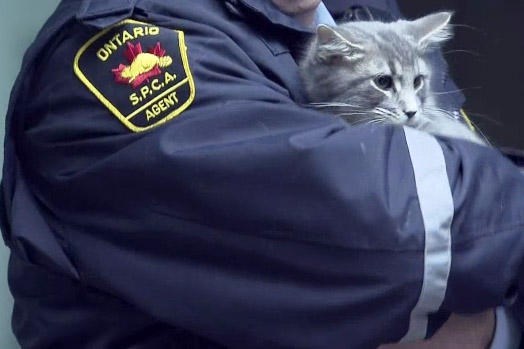For the first time in 100 years, the Ontario Society for the Prevention of Cruelty to Animals is no longer enforcing the province's animal protection laws.
The OSPCA surrendered that responsibility June 28, with local police forces now in charge of laying charges – at least for now. The move came after a court ruling Jan. 2 that said the society shouldn't have police powers unless they have similar transparency and accountability.
A news release from the province June 29 said an interim animal protection model is now in effect “to keep animals safe as the province transitions to a new system that is more robust, transparent, and accountable.”
The temporary model includes a toll-free number available 24/7 to report animal welfare concerns 1-833-9ANIMAL (1-833-926-4625), and an interim chief inspector who will appoint local inspectors.
“A team of inspectors will be responsible for animal protection in the province and will have subject matter expertise in livestock and agriculture, horses, and zoos and aquariums,” the release said.
“Developing a new model for animal protection cannot be rushed, and is it too important not to get right. This is a temporary solution to fill in the gaps while Ontario transitions to a new model.”
Joe Couto, a spokesperson for the Ontario Association of Chiefs of Police, said forces in the province are still concerned about the impact the change will have, but they're willing to give them time as they work on a new system.
In the meantime, local police forces will be called on to lay charges, and the impact on police is still uncertain, Couto said.
“I think what the province is doing is probably correct,” he said. “They need to take a good hard look at the previous regime, if you will, and you find out why it didn't work and put something in place that will, in the long term, protect animals.”
Police will handle criminal complaints, Couto said, but exactly how many calls and how much of an added time burden police face is still unknown.
“Whether or not it will be a substantial impact on our resources, that really remains to be seen,” he said. "But the province is working toward a longer-term solution, so even if there's a bit of a bump in short term, I think that would be understandable.
“The bottom line is our police officers are not going to let an animal in distress be in distress if they can help it. Of course we're going to do it. We don't want it to take away from the officers ability to address other criminal type calls.”
Alison Cross, spokesperson for the OSPCA, said many in the public don't realize that cruelty investigations made up just 20 per cent of the work the organization does. And the group will very much still play a role in protecting animals.
“Part of it will be interlinking with what our enforcement services were doing before,” Cross said. “So for example out of the 23,000 cruelty complaints that we received (last year), only 150 of those led to charges before the court.”
The OSPCA will act as a resource for police during the transition, she said, offering their expertise and experience.
“We've had about 40 different police services reach out to us and ask us to talk further about what that looks like and how they can work together with us,” she said.
Police were already the lead investigators in about two-thirds of the province, Cross said, and so the OSPCA already knows how that relationship can work. For example, if police seize animals, the OSPCA can care for them while the case makes its way through the legal system.
And the society is getting more active on the prevention side, with their mobile low-cost spay and neuter clinics expanding their work, including into Greater Sudbury.
“Yes, it will be going to Northern Ontario,” Cross said. “We are working to provide more services to all our northern communities. So you'll more and more of those (mobile clinics) going around the province, as well.”
Couto said the province hasn't said when a permanent solution will be in place, but he's hoping that it will be soon.
“We obviously told (the province) that the sooner, the better,” he said. “And we would expect by the end of this calendar year that certainly the government would have would have something in place. So hopefully in the fall they'll be able to announce some further steps.
“But they are in agreement with us that the police should not be the primary responders,” Couto said.
